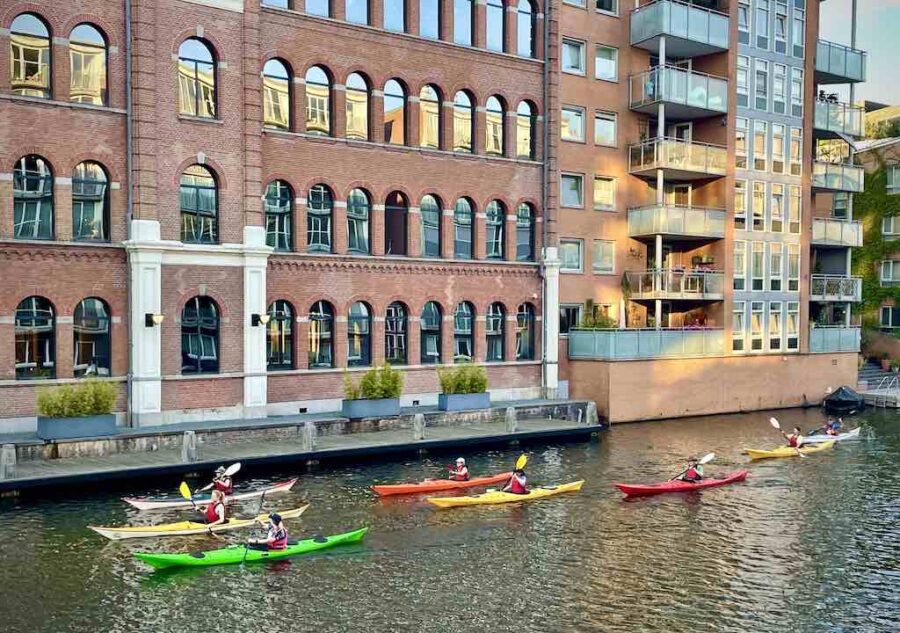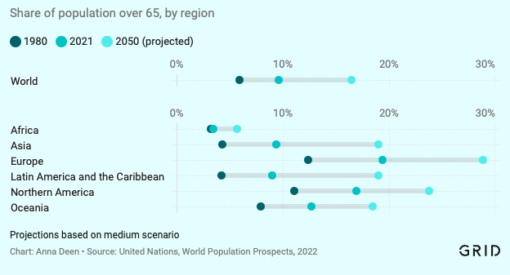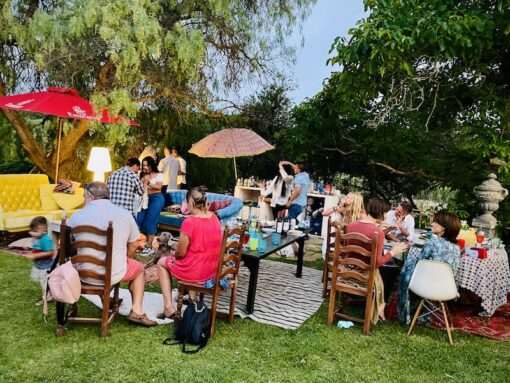
Co-Housing: A Better Way To Age In Place?
Several articles feature the ageing population in different parts of the world over the past 2 weeks:
- China’s population shrinks for the first time in 60 years with profound impact on the world
- Japan’s plummeting population causing government to issue grave warning
- South Korea broke its own global fertility record at 0.79 birth per woman, well on its way to being the country with the highest proportion of elderly people in the world.
- Singapore’s 2023 Action Plan for Successful Ageing is a slew of initiatives and plans to encourage active ageing, promising more community care facilities catering to the elderly.
Global Challenge
In 2021, the world recorded 760 million people 65 years or older. By 2050, this cohort will more than double to 1.6 billion.

This silver tsunami brings unprecedented challenges – lesser consumers, loss of economic dynamism, smaller workforce to support older generations, collapse of pension system, ballooning healthcare costs…
Personal Issue
But what about at a personal level? Beyond what the government and public institutions are doing, what can we do to help ourselves? In the end, ageing is a personal issue. Relying on the government to solve it is not prudent, to say the least. Besides, the options or solutions offered may not suit our personal circumstance or preference.
One thing for sure, we want to age better than the way our grandparents did, or our parents. Because we are better educated, more well-travelled, healthier, digitally more savvy and living longer. With 100 becoming the new 80, we are even starting to witness the emergence of super agers. It is hence important to ensure we surf the silver crest instead of being engulfed by it.
Age in Place
From many surveys and findings, ageing in place – which means to age in one’s own home – will become increasingly important on how well a society copes with this issue. A recent US study reported that 88% of seniors expressed a preference to age in place.
Europe has long advocated and actively promotes ageing in place with many supporting schemes such as regular home care visitations. While there is no data for Asia, I suspect the percentage would be the same or higher. This is because home and family play such a central role in our culture.
However, the current set-up for ageing in place does not address many of the issues faced by seniors such as loneliness, boredom, social isolation, safety within the home, help with groceries, burden of maintaining a home at older age etc. And adapting the current home to make it suitable to age in place takes much planning, money, time and effort that can be quite heavy if undertaken alone.

Collaborative Housing
Nobody fantasises about growing old. But just as it is important to make friends with our older self to age happily, it is necessary to ‘foresee’ how we will age.
A new and growing movement is collaborative housing (co-housing), which is living with a community of friends. This community will have shared facilities like landscaped garden, gym, household equipment like washing machines, fridges, vacuum cleaners etc. There will also be communal areas, in addition to fully equipped self-contained apartments. It can be newly constructed or renovated from an existing structure.

Communal areas will host gatherings for special events like New Year or birthdays. These areas can also serve as home theatre, library, yoga studio, games room, cooking studio or other shared activities. One can retreat to one’s own apartment for private time but can easily be with friends whenever so desired.
Benefits
Ageing in place by co-housing provides huge cost-sharing benefits in addition to physical and mental benefits. Maintenance and upkeep, car-sharing, hiring of cleaner, cook, gardener or engaging on-site services like hairdressers, physiotherapists, nurses, doctor-on-call services etc. Increased convenience, better affordability and quality of life.
Isn’t it more fun to live with good friends instead of a retirement community of strangers, regardless how luxe the latter is?
Growing old and living with people who know us, our family and other friends, with common experiences and shared history definitely makes it a sweeter experience.
Together
The very act of moving into a co-housing will trigger us to declutter. Although this means leaving our old home, it provides a fresh start to improved living, financially, physical and emotionally.
The new environment will be built with safety and comfort in mind, with a slew of technologically enabled features like smart lighting, heating/cooling system, voice activated devices etc. As this community is custom-built, it takes into account specific requirements of each component household. Cost-sharing will keep it affordable compared to going it alone.
Staying Engaged
An important part of active ageing is to stay engaged. Co-housing provides mental and physical stimulation, staves off boredom and makes us happier without having to stepping out of the home compound.

There are many ways to make co-living fun. Because burdens and costs are shared, it opens up many more choices such as looking after pets together, co-owning cars, scheduling games session, cooking together, organising talks on will-writing or organising wine tasting or other interesting events. It is proven that social engagement improves health and longevity.
It is easier to keep healthy with mutual support to maintain good lifestyle habits. An instructor for tai-chi or yoga class or follow an exercise video before having a healthy breakfast together.

Going grocery shopping and taking turns to cook or cooking together. Deploy the power of everyday to build better habits and remind each other to use what we have so we don’t loose it. Doing activities together is always more fun and that these activities make us healthier physically and mentally triple the benefits.
Keep An Eye and Ear Out
Co-housing enables us to keep an eye and ear out for each other. Help is available should one fall or encounter other mishaps. Some physical deterioration, like hearing loss, happen so slowly that we may not notice it ourselves. This leads to grave consequences if left untreated. Co-housing with engagement in daily activities will ensure early detection and hence, timely treatment.
Learn Together
With so many new knowledge and technology coming into our lives, it is fun to learn together to make sure we stay on the right side of the digital divide. Co-housing is a good way to motivate and encourage each other to keep abreast of new developments, especially those impacting to our lives. The metaverse, blockchain technology and AI devices, to name a few.
These new technology can add tremendously to the quality of our lives, much like how the smart phones, computers and the internet have, bringing more convenience and comfort. After all we have 1 life, and it would be a shame to waste it by not living to the fullest and enjoying the benefits of these new developments.

Help Ourselves
While society and the world grapples with how best to manage the ageing population, it is pertinent that we seek our own solutions that suit us financially, physically and emotionally.
Does ageing in place by co-housing appeal to you? Then I encourage you to start appropriate conversations with your circle of friends. This way, you can take charge of your own ageing and destiny.
After all it’s our life, our retirement, our happiness.
Let’s make silver the new black!
Savvy Maverick
(Main image: Fleet of canoes on an Amsterdam canal, Savvy Maverick)
Disclaimer: The views expressed here are drawn from my own experiences and do not constitute financial advice in any way whatsoever. Nothing published here constitutes an investment recommendation, nor should any data or content be relied upon for any investment activities. It is strongly recommended that independent and thorough research be undertaken before making any financial decisions, including consulting a qualified professional.
